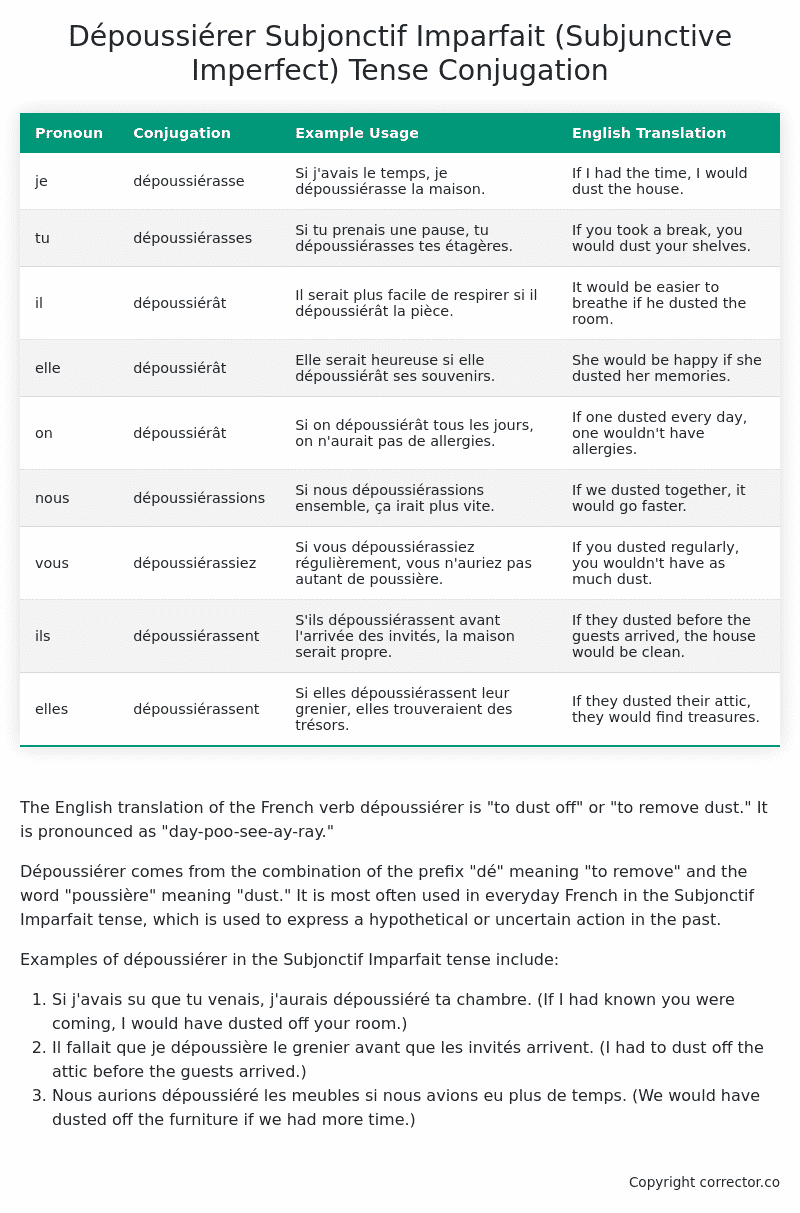Subjonctif Imparfait (Subjunctive Imperfect) Tense Conjugation of the French Verb dépoussiérer
Introduction to the verb dépoussiérer
The English translation of the French verb dépoussiérer is “to dust off” or “to remove dust.” It is pronounced as “day-poo-see-ay-ray.”
Dépoussiérer comes from the combination of the prefix “dé” meaning “to remove” and the word “poussière” meaning “dust.” It is most often used in everyday French in the Subjonctif Imparfait tense, which is used to express a hypothetical or uncertain action in the past.
Examples of dépoussiérer in the Subjonctif Imparfait tense include:
- Si j’avais su que tu venais, j’aurais dépoussiéré ta chambre. (If I had known you were coming, I would have dusted off your room.)
- Il fallait que je dépoussière le grenier avant que les invités arrivent. (I had to dust off the attic before the guests arrived.)
- Nous aurions dépoussiéré les meubles si nous avions eu plus de temps. (We would have dusted off the furniture if we had more time.)
Table of the Subjonctif Imparfait (Subjunctive Imperfect) Tense Conjugation of dépoussiérer
| Pronoun | Conjugation | Example Usage | English Translation |
|---|---|---|---|
| je | dépoussiérasse | Si j’avais le temps, je dépoussiérasse la maison. | If I had the time, I would dust the house. |
| tu | dépoussiérasses | Si tu prenais une pause, tu dépoussiérasses tes étagères. | If you took a break, you would dust your shelves. |
| il | dépoussiérât | Il serait plus facile de respirer si il dépoussiérât la pièce. | It would be easier to breathe if he dusted the room. |
| elle | dépoussiérât | Elle serait heureuse si elle dépoussiérât ses souvenirs. | She would be happy if she dusted her memories. |
| on | dépoussiérât | Si on dépoussiérât tous les jours, on n’aurait pas de allergies. | If one dusted every day, one wouldn’t have allergies. |
| nous | dépoussiérassions | Si nous dépoussiérassions ensemble, ça irait plus vite. | If we dusted together, it would go faster. |
| vous | dépoussiérassiez | Si vous dépoussiérassiez régulièrement, vous n’auriez pas autant de poussière. | If you dusted regularly, you wouldn’t have as much dust. |
| ils | dépoussiérassent | S’ils dépoussiérassent avant l’arrivée des invités, la maison serait propre. | If they dusted before the guests arrived, the house would be clean. |
| elles | dépoussiérassent | Si elles dépoussiérassent leur grenier, elles trouveraient des trésors. | If they dusted their attic, they would find treasures. |
Other Conjugations for Dépoussiérer.
Le Present (Present Tense) Conjugation of the French Verb dépoussiérer
Imparfait (Imperfect) Tense Conjugation of the French Verb dépoussiérer
Passé Simple (Simple Past) Tense Conjugation of the French Verb dépoussiérer
Passé Composé (Present Perfect) Tense Conjugation of the French Verb dépoussiérer
Futur Simple (Simple Future) Tense Conjugation of the French Verb dépoussiérer
Futur Proche (Near Future) Tense Conjugation of the French Verb dépoussiérer
Plus-que-parfait (Pluperfect) Tense Conjugation of the French Verb dépoussiérer
Passé Antérieur (Past Anterior) Tense Conjugation of the French Verb dépoussiérer
Futur Antérieur (Future Anterior) Tense Conjugation of the French Verb dépoussiérer
Subjonctif Présent (Subjunctive Present) Tense Conjugation of the French Verb dépoussiérer
Subjonctif Passé (Subjunctive Past) Tense Conjugation of the French Verb dépoussiérer
Subjonctif Imparfait (Subjunctive Imperfect) Tense Conjugation of the French Verb dépoussiérer (this article)
Conditionnel Présent (Conditional Present) Tense Conjugation of the French Verb dépoussiérer
Conditionnel Passé (Conditional Past) Tense Conjugation of the French Verb dépoussiérer
L’impératif Présent (Imperative Present) Tense Conjugation of the French Verb dépoussiérer
L’infinitif Présent (Infinitive Present) Tense Conjugation of the French Verb dépoussiérer
Struggling with French verbs or the language in general? Why not use our free French Grammar Checker – no registration required!
Get a FREE Download Study Sheet of this Conjugation 🔥
Simply right click the image below, click “save image” and get your free reference for the dépoussiérer Subjonctif Imparfait tense conjugation!

Dépoussiérer – About the French Subjonctif Imparfait (Subjunctive Imperfect) Tense
Formation
Common Everyday Usage Patterns
Interactions with Other Tenses
Subjonctif Présent
Indicatif Passé Composé
Conditional
Conditional Perfect
Summary
I hope you enjoyed this article on the verb dépoussiérer. Still in a learning mood? Check out another TOTALLY random French verb conjugation!


